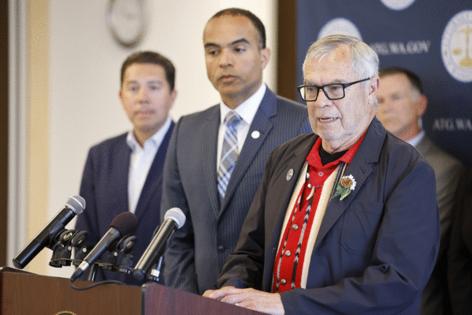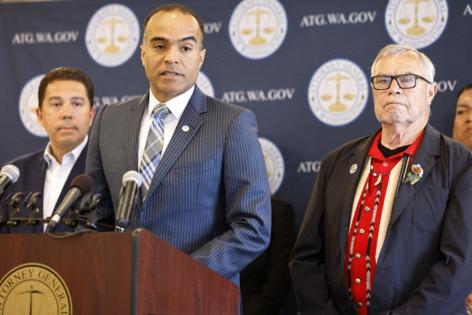Washington, 14 other states sue Trump over his order to shortcut reviews on fossil fuel projects
Published in Political News
SEATTLE — Washington is leading 14 other states in a new lawsuit challenging President Donald Trump’s executive order declaring a “national energy emergency” and seeking to shortcut environmental reviews for oil drilling, pipelines and other fossil fuel projects.
The lawsuit, announced by Attorney General Nick Brown at a news conference Friday, was filed in U.S. District Court for the Western District of Washington.
Criticizing Trump’s emergency declaration as “fake,” Brown noted it came even though U.S. energy production is at an all-time high.
“This is not a serious or lawful effort by the president. It is all about eliminating competition and shackling America to dirty fossil fuels forever,” Brown said at the Seattle news conference.
Trump’s executive order was part of a flurry of directives issued on his first day in office this year. It seeks to boost oil, gas and other fossil fuel production, while excluding solar and wind energy projects.
The 61-page lawsuit contends Trump’s order violated the National Emergencies Act, passed by Congress in 1976 to ensure that presidents use their emergency powers “only when actual emergencies exist” and not for “frivolous or partisan matters.”
Previously, according to the lawsuit, the U.S. Army Corps. of Engineers and other federal agencies have limited their use of emergency procedures to fast track permits after major disasters such as hurricanes and floods, or the 2010 Deepwater Horizon explosion and oil spill in the Gulf of Mexico.
“But now, prodded onto the shakiest of limbs by the President’s unsupported and unlawful Executive Order, multiple federal agencies now seek to broadly employ these emergency procedures in non-emergency situations,” the lawsuit says.
Trump’s order attacked what it called the “shortsighted and harmful policies” of his predecessor, President Joe Biden, and contended “swift and decisive” action was needed to bolster fossil fuel production.
“We will drill, baby, drill,” Trump said, touting the emergency order during his second inaugural address.
“Our Nation’s current inadequate development of domestic energy resources leaves us vulnerable to hostile foreign actors and poses an imminent and growing threat to the United States’ prosperity and national security,” Trump declared in the executive order.
The problems, Trump’s order said, “are most pronounced” in the northeastern U.S. and on the West Coast, where he said “dangerous” climate policies “devastate the prosperity of not only local residents but the entire United States population.”
The order defines “energy resources” it wants to boost as as chiefly fossil fuels, specifying crude oil, natural gas and refined petroleum products, as well as uranium and coal. The order also includes biofuels, geothermal heat and hydropower, but excludes wind, solar and battery projects.
The order has led federal agencies to begin bypassing or shortening reviews of energy projects under the Clean Water Act, the Endangered Species Act and the Historic National Preservation Act, according to the lawsuit.
In February, the U.S. Army Corps of Engineers listed 688 permits for projects around the country that were subject to the emergency order, the lawsuit said.
In Washington, the lawsuit cites four projects the Corps is trying to push ahead based on the emergency order, circumventing established laws and environmental requirements. That includes replacements and repairs on natural gas pipelines that run underneath the Little Washougal River and the Columbia River.
Brown was joined at the news conference by Casey Sixkiller, head of the state Department of Ecology, and Bill Iyall, general council chair of the Cowlitz tribe.
Iyall said the tribe wants to preserve its “cultural and natural resources” along the lower Columbia River, and is worried the fast-tracking under the Trump’s order will make that harder.
“Looking at a project individually, if you did it carefully and planned it carefully, you would be able to minimize those impacts,” Iyall said.
The lawsuit asks a court to declare Trump’s order unlawful and to prohibit federal agencies from issuing fast-tracked permits based on the order.
Along with Trump, the lawsuit filed Friday names as defendants the head of the U.S. Army Corps of Engineers and the Advisory Council on Historic Preservation. Other states joining the case include California, Arizona, Connecticut, Illinois, Massachusetts, Maine, Maryland, Michigan, Minnesota, New Jersey, Oregon, Rhode Island, Vermont and Wisconsin.
The lawsuit is Brown’s 17th against the Trump administration.
The cases have included challenges to Trump’s efforts to revoke birthright citizenship, end DEI programs in schools, and several attempts to cut congressionally approved funding for public health, scientific research and other services.
Several have succeeded in obtaining court orders temporarily blocking Trump’s actions. The birthright citizenship case is headed to the U.S. Supreme Court next week.
©2025 The Seattle Times. Visit seattletimes.com. Distributed by Tribune Content Agency, LLC.































































Comments